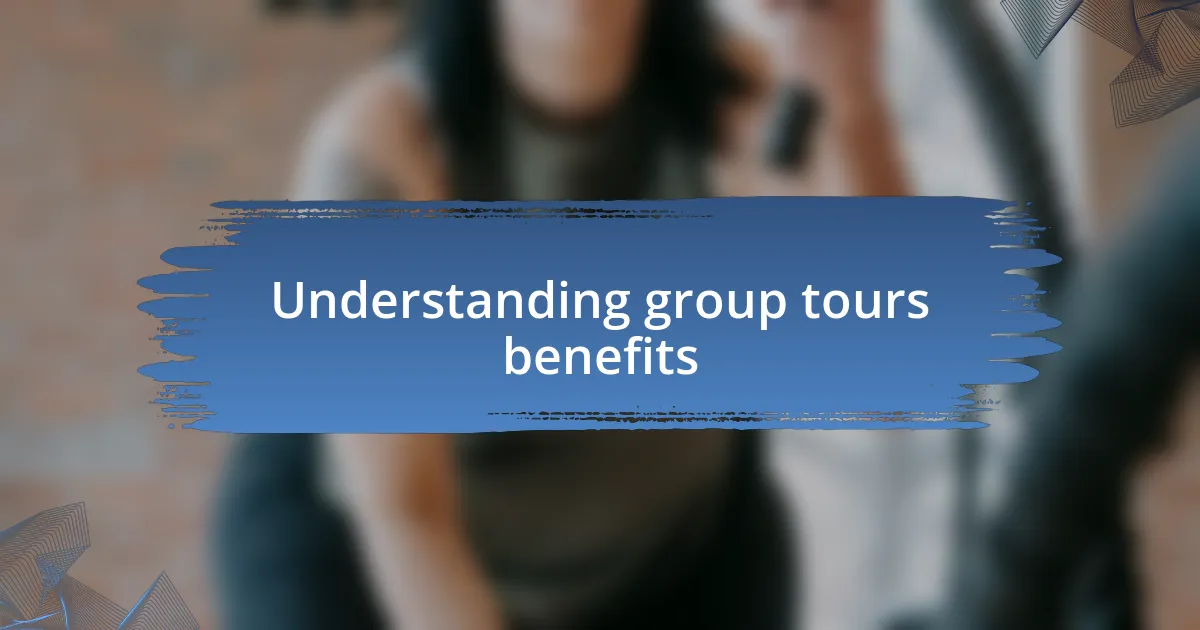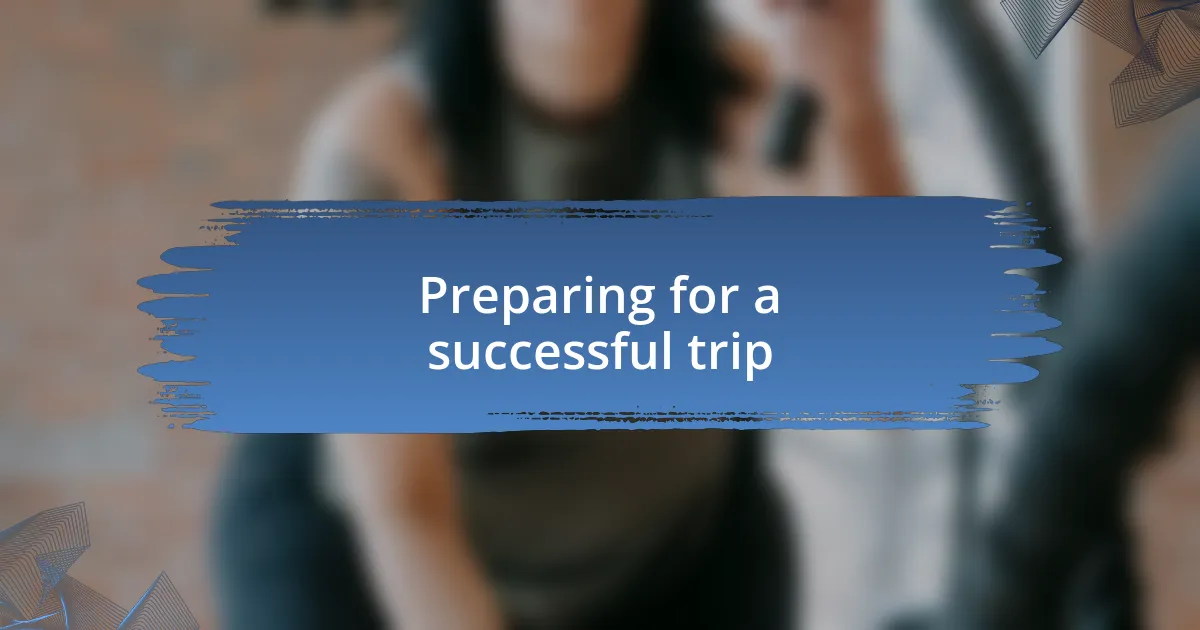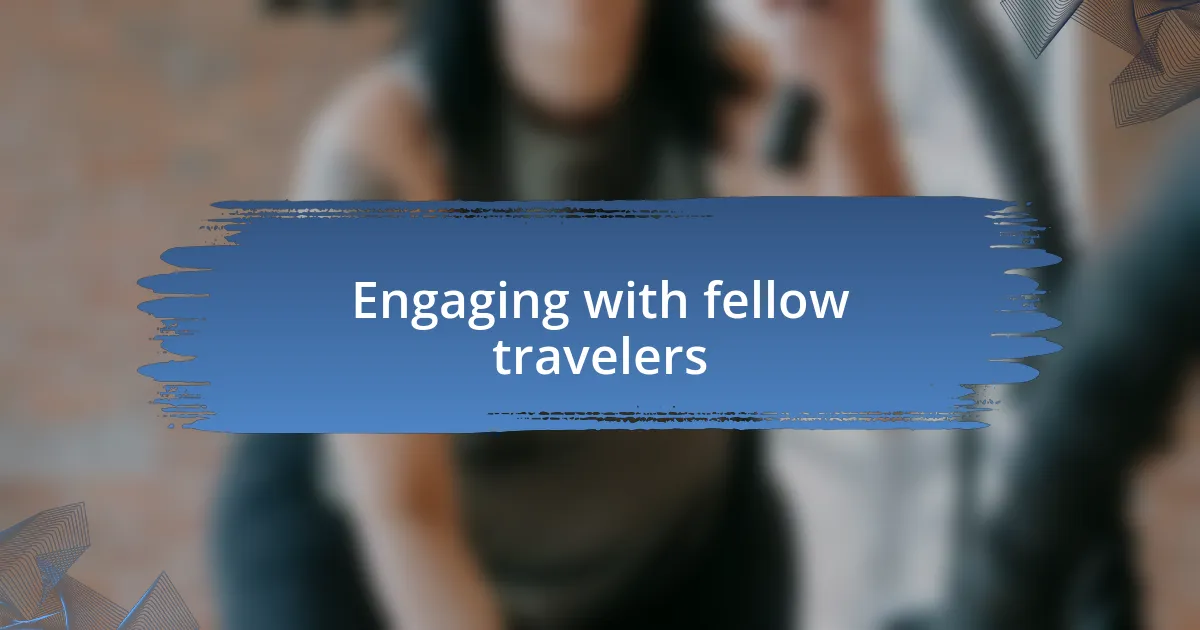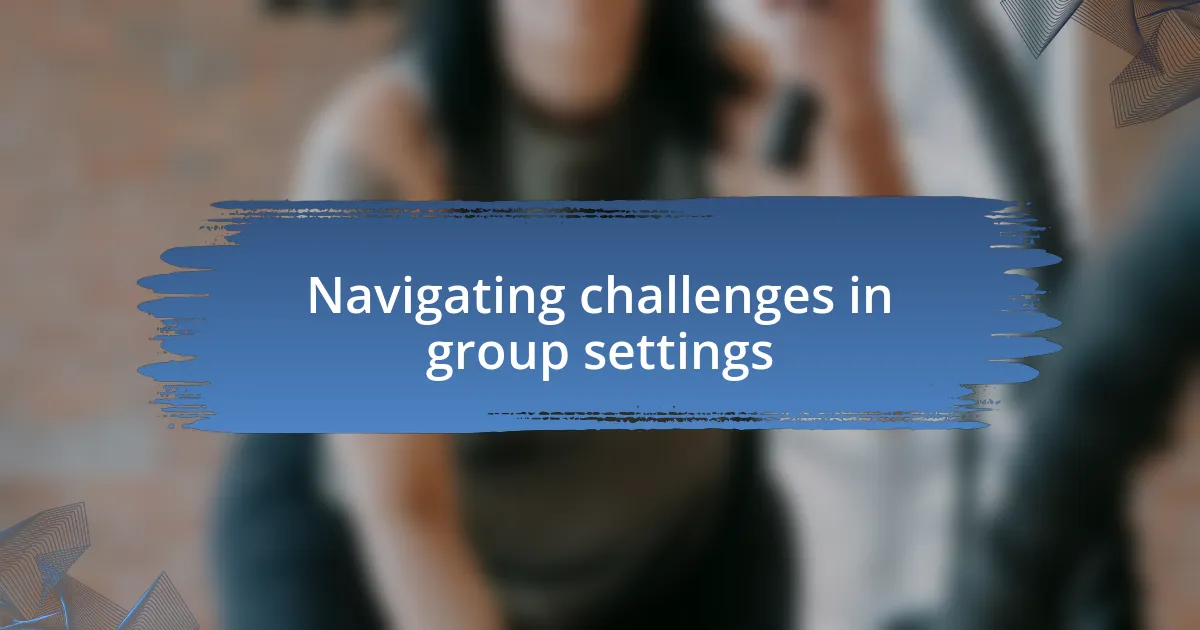Key takeaways:
- Group tours foster camaraderie and shared experiences, enriching the overall travel experience.
- Choosing the right tour group involves considering group size, focus, reputation, and guide expertise for a more personalized adventure.
- Preparation, including packing and cultural research, enhances comfort and engagement during travel.
- Flexibility and openness to new experiences, such as spontaneous detours or local interactions, can transform a trip into a memorable adventure.

Understanding group tours benefits
One of the most significant benefits of group tours is the sense of camaraderie that develops among travelers. I remember a trip to Italy where I bonded with fellow travelers over shared experiences, like getting lost in the narrow streets of Florence. There’s something special about exploring together, as laughter and stories exchanged create memories that you’ll cherish long after the journey ends.
Moreover, group tours often provide access to exclusive experiences and local insights that would be hard to come by if you were traveling solo. On my last group tour in Japan, our guide took us to a hidden tea house where we learned the delicate art of tea preparation. This intimate experience not only enriched my understanding of Japanese culture, but also made me appreciate the value of having a knowledgeable guide who knows the ins and outs of a destination.
Many might wonder if traveling in a group compromises personal freedom. From my experience, it’s quite the opposite! Structured itineraries balance shared activities and personal time perfectly. I found those moments of exploration alone, like wandering around a quiet temple in Kyoto, to be deeply fulfilling, while still having the excitement of sharing the day’s adventures over dinner with newfound friends. Isn’t that the best of both worlds?

Choosing the right tour group
Choosing the right tour group can significantly enhance your travel experience. When considering which group to join, I always pay attention to the group’s size and dynamics. On a recent trip to Greece, I chose a smaller group of just ten participants, which allowed for more meaningful interactions and deeper connections with both the guide and my travel companions. It’s amazing how a simple choice of group size can transform your journey into a more intimate adventure.
When evaluating a tour group, here are some key factors to consider:
- Focus and Interests: Does the group cater to specific interests, like food, history, or outdoor activities?
- Reputation and Reviews: What do past travelers say about their experiences? Check platforms like TripAdvisor for insights.
- Itinerary Flexibility: Are there options for personalization, or is the itinerary rigid?
- Guides’ Expertise: Is there a knowledgeable guide leading the group, providing insights beyond the usual tourist spots?
- Group Size: How many participants are there? Smaller groups often lead to richer experiences.
In my experience, understanding these aspects helps ensure that the tour aligns with my expectations and enriches my travel adventure.

Preparing for a successful trip
Preparing for a successful trip involves a blend of practical arrangements and mental readiness. One crucial step I’ve learned is to create a detailed packing list that accounts for various activities anticipated on the trip. On one occasion, I underestimated this need during a hiking tour, only to find myself without the appropriate footwear. That experience taught me the importance of preparation in ensuring comfort and enjoyment.
Emotional readiness also plays a significant role in the overall travel experience. Before setting out, I like to take a moment to visualize the journey ahead and express gratitude for the opportunity to explore new places. This positive mindset can shift how I interact with my travel group and the experiences we share. Reflecting on past trips, I’ve realized how being mentally prepared can make each moment feel richer and more fulfilling.
It’s also important to familiarize oneself with the destination. I often spend time researching cultural customs or local cuisines. During a recent tour in Japan, this preparation allowed me to engage more meaningfully, making it easier to connect with locals and my fellow travelers over shared interests.
| Preparation Step | Personal Experience |
|---|---|
| Packing List | Learned the hard way about necessary footwear on a hiking tour. |
| Mental Readiness | Visualizing the trip made interactions more enjoyable. |
| Cultural Research | Connecting with locals became easier after I learned about their customs. |

Engaging with fellow travelers
Engaging with fellow travelers creates a sense of community that can transform a trip. I remember a moment during a group tour in Italy when our guide encouraged us to share our travel stories over dinner. This simple invitation led to laughter, bonding, and discovering shared interests that ignited friendships I still cherish today. Have you ever felt how a shared experience can elevate your journey?
It’s fascinating to witness how a smile or a genuine compliment can break the ice. During a recent excursion, I struck up a conversation with a couple from Australia just by complimenting their travel gear. That brief exchange turned into an hour-long discussion about our favorite destinations, exchanging tips and stories that enriched our adventure. It’s amazing how small moments can lead to meaningful connections.
I find that participating in group activities also fosters deeper connections. On one tour, we teamed up for a cooking class that not only taught us about local cuisine but also allowed us to collaborate and bond over our culinary attempts. Watching my fellow travelers cheer each other on as we attempted to knead dough and mix ingredients reminded me that shared challenges can create lasting memories. How have group activities helped you connect with others while traveling?

Maximizing your travel experience
Maximizing your travel experience often hinges on being open to new adventures. I vividly recall a group hiking trip where we ventured off the beaten path. Instead of sticking to the planned route, a handful of us chose to explore a hidden waterfall we spotted in the distance. This spontaneous decision led to one of the most breathtaking views I’d ever encountered, not to mention a few incredible photos and shared laughter. Have you ever taken a chance on a detour that changed your entire experience?
Another way I’ve found to enhance my travels is by actively seeking out local experiences. On a recent tour, we had the option to join a local family for dinner. I remember the warmth of their hospitality and the joy in sharing their favorite traditional dishes. This intimate setting allowed me to gain insights into their culture that no guidebook could ever provide. How often do you find yourself immersing in the local way of life?
Lastly, I believe in embracing flexibility on group tours. There was a moment during a city tour when our guide suggested we skip a crowded museum in favor of an artist’s market nearby. Initially hesitant, I decided to go along. It turned out to be a delightful afternoon filled with unique crafts and engaging conversations with artisans. That choice transformed a standard itinerary into a memorable adventure. What unexpected choices have you made that enriched your travel experience?

Navigating challenges in group settings
Group settings can sometimes feel overwhelming, especially when different personalities and preferences collide. I remember a time when half of our group wanted an early start to the day while others preferred a more leisurely breakfast. It was a challenge to navigate this divide, but we ultimately found a compromise and split our breakfast into two time slots. This way, everyone felt included, and we still managed to set off together. How have you adapted to similar situations?
Another challenge I faced was dealing with various communication styles within the group. On a trip that included multiple language speakers, I noticed some people were hesitant to voice their opinions due to language barriers. To counter this, I started encouraging quieter members to share their thoughts, often rephrasing the discussion in simpler terms. This approach not only boosted confidence among participants but also fostered collaboration and camaraderie. Have you found strategies to empower your fellow travelers?
Dealing with schedule conflicts can also be tricky. During a sightseeing tour, we faced unexpected delays at one location, which threatened our planned visit to the next site. Instead of panicking, our guide rallied the group to adapt. Some of us shared ideas for alternative activities we could pursue while waiting, transforming potential frustration into a spontaneous neighborhood exploration instead. I’ve learned that a positive attitude can turn challenges into memorable experiences. What’s been your experience with adapting plans on the fly?


